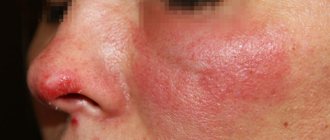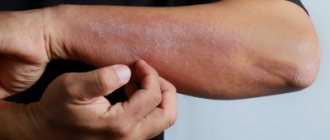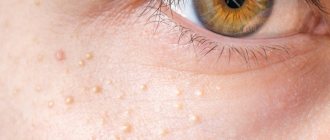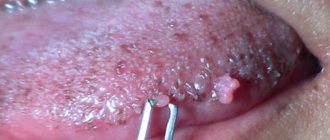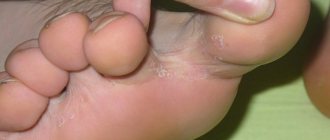What does a dermatovenerologist treat?
Modern dermatovenereology is one of the most extensive areas of therapeutic science, and a dermatovenereologist treats diseases belonging to its different areas:
- dermatology – diseases of the skin and its appendages: nails, hair, sebaceous and sweat glands – psoriasis, vitiligo, atopic dermatitis, eczema, alopecia, folliculitis, etc.;
- venereology – sexually transmitted diseases, genital infections and sexually transmitted diseases: syphilis, gonorrhea, molluscum contagiosum, chancroid, herpes, trichomoniasis, mycoplasmosis, etc.;
- mycology – diseases caused by fungi, including candidiasis;
- conservative cosmetology, the goal of which is to improve the appearance of the skin without surgery.
What remedy helps with acne?
To choose an effective medicine for acne*, you need to correctly determine the severity of acne and understand the causes of acne. Only a specialist can do this. Azelaic acid preparations can be used in the treatment of acne9. One of these is Azelik® gel, it has the following effects5:
- normalizes keratinization processes in sebaceous hair follicles;
- reduces the level of free fatty acids in skin lipids;
- exhibits antimicrobial activity against acnes and S. epidermidis;
- has an anti-inflammatory effect by reducing the metabolism of neutrophils and their production of free radical forms of oxygen.
The first results from using Azelik® gel can be seen after 4 weeks of use5.
*acne
When to contact a dermatovenerologist
Skin is the largest organ of the human body. Currently, there are a huge number of dermatoses and chronic skin diseases, the treatment of which must be carried out in a timely manner. In addition, many skin diseases have a chronic course and are prone to frequent relapses. Contagiousness is another feature common to many skin and venereal diseases.
Unprotected sexual intercourse is a matter of particular concern for one’s own health. Sexually transmitted diseases - sexually transmitted diseases and sexually transmitted infections when neglected can cause irreversible harm to many organs and systems of the body. Modern medicine lists more than 10 sexually transmitted diseases. A dermatovenerologist can successfully cope with all these diseases with the help of timely diagnosis and the prescription of modern medications.
The following symptoms should be the reason for consulting a dermatovenerologist:
- skin rashes on the mucous membranes, genitals, skin of the body;
- itching of the skin;
- changes in skin pigmentation;
- the appearance of various neoplasms on the skin or mucous membranes;
- pustules in the mouth, white plaque on the inside of the cheeks and tongue;
- changes in the color and structure of nails;
- peeling of the skin;
- hair loss has become more intense than usual;
- itching of the scalp, formation of profuse dandruff;
- hair fragility;
- changed color, structure, size of the mole;
- discomfort or pain during sexual intercourse;
- more abundant than usual discharge from the genitals with an uncharacteristic color or odor;
- development of ulcers, rashes, itching in the genital area and mucous membranes of the mouth;
- frequent urge to urinate;
- burning in the genitals;
- pain in the genitals, testicles, abdominal area.
Self-medication or treatment using traditional medicine methods for sexually transmitted diseases is unacceptable and will not lead to results. If the patient has even the slightest reason for concern, it is necessary to see a dermatovenerologist. Timely therapy prescribed by a dermatovenerologist allows you to avoid unpleasant and dangerous consequences and complications and restore health. Modern drug treatment allows you to get rid of sexually transmitted diseases reliably and without dangerous consequences and complications. It is worth remembering that both sexual partners need to be treated by a dermatovenerologist.
A dermatovenerologist performs a preventive examination when a patient registers for work or study.
The most common subcutaneous diseases
In first place in terms of prevalence are atheromas - these are diseases that are popularly called “wen”. Formations arise due to improper functioning, figuratively speaking, blockage of the sebaceous glands. The formation is located under the skin and is movable; when pressed with a finger, the wen “runs away”. Atheroma often hurts and can become inflamed, then the skin in this place acquires a reddish tint. Atheroma can appear anywhere, but it practically never occurs on the palms and soles. There are types of atheromas in the form of small white peas that often appear on the face.
Despite the fact that atheroma is, in principle, a harmless formation, it can appear in a visible place, creating a cosmetic defect, or simply interfere if, for example, it is located on the neck. In these cases, the atheroma is removed surgically or, if the technique allows, with a laser and cryodestruction (cold). I also remove atheroma in cases where it hurts or becomes inflamed.
But the most dangerous thing is to confuse atheroma with another formation - inflammation of the lymph node or cancer. Therefore, before surgical removal, we prescribe an ultrasound examination, and after the operation, a histology examination (a specialist checks the removed formation under a microscope).
How is the appointment going?
What does a dermatovenerologist do during an appointment? The initial consultation with a dermatovenerologist begins with collecting the patient’s medical history and complaints. The dermatovenerologist will definitely clarify whether treatment was previously carried out and what medications were used. In the case of chronic skin diseases (psoriasis, vitiligo, atopic dermatitis), the doctor will clarify whether the patient has a family history of these diseases. The patient’s goal at this stage of admission is to formulate as accurately as possible the complaints about the conditions that bother him.
What does a dermatovenerologist look for:
- healthy skin areas;
- pathological areas of the skin;
- assesses the prevalence of the process.
Very often, already at this stage the doctor can assume the correct diagnosis, based on his own experience. If any doubt arises, the dermatovenerologist will necessarily prescribe additional laboratory and instrumental tests:
- general blood analysis;
- scraping the skin for mites;
- bacteriological culture;
- microscopic mycological examination;
- smear of the rash element;
- smear for urogenital infections;
- linked immunosorbent assay;
- biopsy of a mole or any other neoplasm;
- PCR diagnostics;
- dermatoscopy.
In some cases, to determine changes in the structure of the tumor or the extent of the pathological process in the deeper layers of the skin, an ultrasound, CT scan, or consultation with a specialist may be required. Cytological examination of neoplasm tissue will help determine the nature of its cells.
After the disease is diagnosed, the dermatovenerologist prescribes treatment.
Skin diseases (psoriasis, atopic dermatitis, vitiligo, neurodermatitis) often have a chronic course and are prone to relapses. Patients with such diseases need constant monitoring by a dermatovenerologist in order to prolong remission and smooth out the severity of the process during an exacerbation.
Who are cosmetologists?
In Russia, such a specialty as a cosmetologist appeared relatively recently. Previously, only dermatovenerologists worked with skin problems, who initially had to undergo advanced training courses that lasted at least 3-3.5 months. Today, any doctor can become a cosmetologist. To do this, you will need to complete a residency within two years. After this, you can get a job at a medical center in this specialty or open your own cosmetology office. It is important to be able to distinguish a qualified cosmetologist with a higher medical education from hundreds of graduates of so-called “beauty institutes”. Such institutions accept students without medical education, their training does not last long, and the graduates, for the most part, do not have the proper competence. A real cosmetologist, whom you can contact with any dermatological problems, treats not only acne and warts and helps fight skin pigmentation. Such a specialist successfully fights infectious diseases of the skin, nails and hair. The need to remove moles causes great controversy. In fact, they should be dealt with by a dermatologist, but cosmetologists with higher medical education also have the right to do this, subject to a number of conditions - a separate office, complete sterility, preliminary consultation of the patient with an oncologist. Cosmetology is more in demand than dermatology, which is why technologies in this area of aesthetic medicine are developing much faster. Cosmetologists have many tools at their disposal to combat skin imperfections and dermatological diseases. This is modern photodiagnostic equipment, as well as laser devices, currents, everything that is needed for cryosurgery, and so on.
Preparing for an examination by a dermatologist-venereologist
In order for the examination by a dermatovenerologist to be as informative as possible, it is necessary to properly prepare for the appointment. As a rule, preparation does not cause any difficulties for the patient. If you have an appointment, please follow these guidelines:
- do not use cosmetics, as well as medicinal ointments and creams on pathologically changed areas of the skin, so as not to change the clinical picture of the rash;
- You can take a shower before use, but do not use aggressive detergents. Use baby soap instead;
- If the cause of your complaints is problems on the scalp or hair, do not wash your hair before visiting a dermatovenerologist for a couple of days. This is necessary so that, if necessary, the doctor can carry out some dermatological tests.
- If you have nail fungus, it is not recommended to cut your nails before visiting a dermatovenereologist because nail particles may be required for microscopic examination. Before visiting a dermatovenerologist, women are advised to remove polish from the nail plate.
- If you suspect a sexually transmitted disease or venereal disease, women should not douche before visiting a dermatovenerologist, so as not to distort the clinical picture of the disease.
When complaining of skin rashes, the patient should remember what could have preceded them: eating unusual foods, contact with animals, taking medications, unprotected sexual intercourse. This information will be necessary for the dermatovenerologist to make the correct diagnosis and prescribe treatment.
If you find yourself with symptoms indicating the development of a dermatovenerological disease, be sure to make an appointment with a dermatovenerologist. The examination and tests will not take much time, but will help dispel doubts about your health status and, if necessary, undergo treatment. Most sexually transmitted diseases respond well to treatment by a dermatovenerologist, and the sooner treatment is started, the higher its effectiveness.
What tests do patients with acne vulgaris* undergo? How to treat acne?
Tests that can be prescribed for acne9,31:
- checking the level of free testosterone, LH (luteinizing hormone), FH (follicle-stimulating hormone), dehydroepiandrosterone sulfate;
- performing a glucose tolerance test;
- clinical blood test;
- general urine analysis;
- biochemical analysis of blood and urine;
Based on the results of the tests, if necessary, consultations with other specialists are prescribed, for example, a gynecologist, an endocrinologist.
Blood and urine tests are usually ordered by a dermatologist or esthetician before antibiotic therapy or retinoid (isotretinoin) treatment31. If it is necessary to take oral contraceptives to correct androgen levels, they should be selected by a gynecologist.



